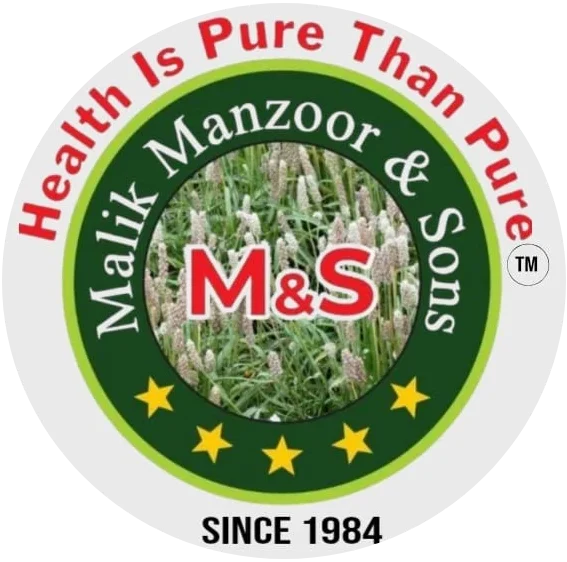What Is Psyllium Husk Good For? The Complete Expert Guide to Nature’s Health Wonder – 2025
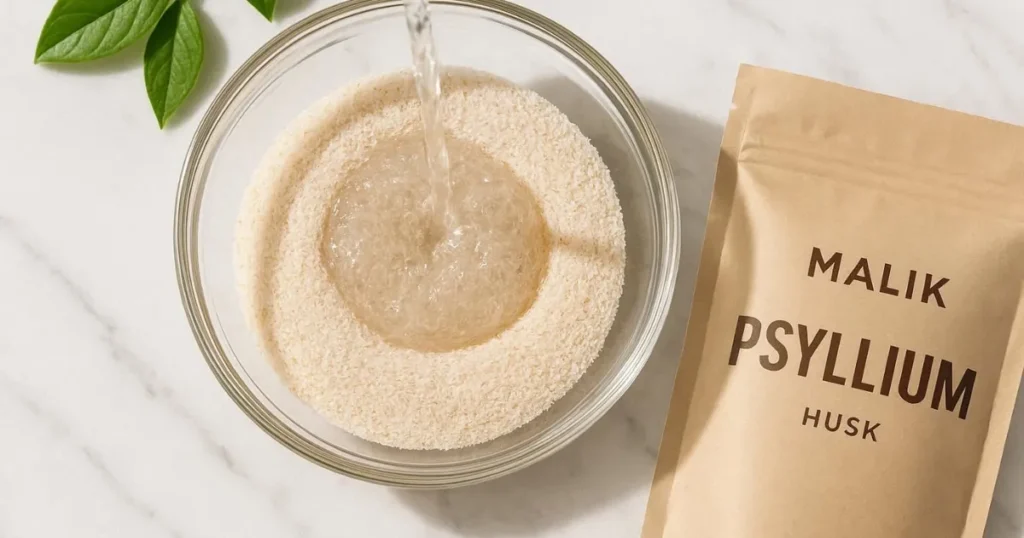
After thirty years of growing, processing, and supplying psyllium across every inhabited continent, one question dominates my conversations; what is psyllium husk good for? It’s a fair question about something so simple yet remarkably powerful. This tiny seed coating has transformed millions of lives, addressing everything from stubborn digestive issues to serious cardiovascular concerns. Whether you’re managing diabetes, fighting cholesterol, seeking natural weight support, or simply optimizing gut health, understanding is psyllium husk good for you and your specific needs makes all the difference. In this expert guide, I’ll share everything you need to know about psyllium husk’s benefits, applications, and practical usage – backed by decades of real-world experience and solid scientific research.
Understanding Psyllium Husk: The Foundation
Let me start with the basics. Psyllium husk comes from Plantago ovata seeds, specifically the outer coating that we carefully separate during processing. This husk contains 70-85% soluble fiber – the key to its therapeutic magic.
When psyllium husk contacts water, something remarkable happens. It absorbs liquid and swells up to 10-14 times its original size, creating a thick, gel-like substance. This isn’t just interesting chemistry – it’s the fundamental mechanism behind every benefit you’ll discover.

Core characteristics:
- Nearly tasteless and odorless
- Light cream to white when pure
- Forms a viscous gel rapidly
- Passes through digestion largely intact
- Contains zero digestible calories
I’ve personally overseen quality testing on thousands of batches, and the consistency of this transformation never ceases to amaze me. Pakistani psyllium, particularly from regions where Malik Psyllium operates, demonstrates superior swelling indices – 12-14 versus 8-10 from other sources – which directly translates to better therapeutic outcomes.
Digestive Health: The Primary Benefit
When people ask what is psyllium husk good for, digestive wellness tops the list. The bulk-forming action addresses multiple gut issues simultaneously.
For constipation relief:
The gel creates a soft, bulky mass in your intestines, stimulating peristalsis – those wave-like contractions moving waste through your system. Unlike harsh chemical laxatives that force action, psyllium works naturally with your body’s rhythms. Most people notice improvements within 12-72 hours, with optimal regularity developing over 1-2 weeks.
For diarrhea management:
Surprisingly, psyllium also helps with loose stools. The fiber absorbs excess water in your intestines, adding form to waste while slowing transit time. This dual-action capability makes it uniquely valuable for irritable bowel syndrome (IBS), where symptoms swing unpredictably between extremes.
For overall gut health:
Regular psyllium use promotes beneficial bacteria growth. The fiber serves as a prebiotic – food for good microorganisms that support immunity, mental clarity, and nutrient absorption. Research shows 35-40% increases in Lactobacillus and Bifidobacterium populations after just 4 weeks of consistent use.
I always recommend starting with small amounts – one teaspoon mixed thoroughly in water – and gradually increasing as your system adapts. Rushing this process causes unnecessary bloating and discomfort.
Cholesterol Management: Cardiovascular Protection
Understanding what is psyllium husk good for extends far beyond digestion. The cardiovascular benefits are scientifically robust and clinically significant.
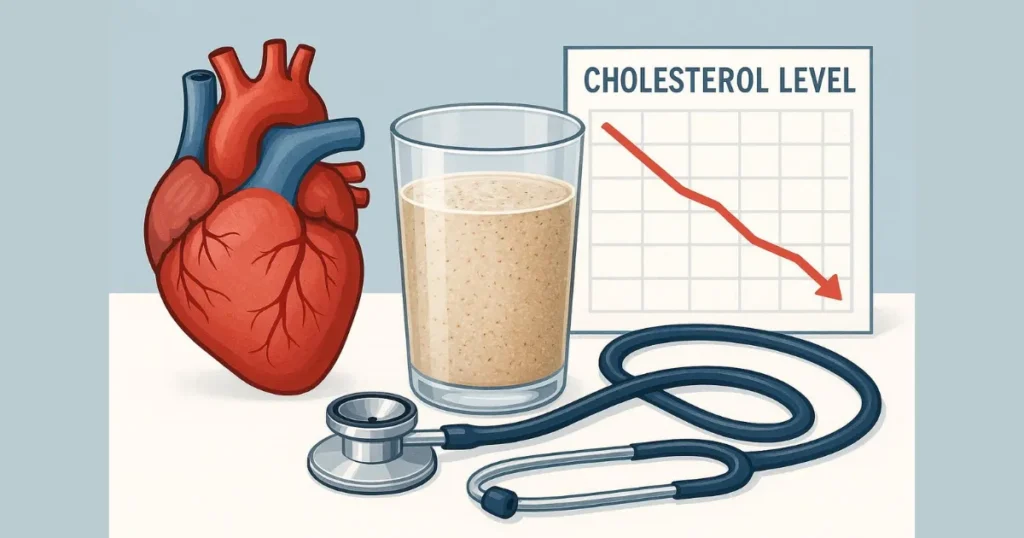
The mechanism:
Soluble fiber binds to bile acids containing cholesterol in your intestines. Your body then eliminates these bound acids, forcing your liver to use existing blood cholesterol to produce new bile acids. This elegant process effectively lowers total cholesterol levels without medication side effects.
The evidence:
Multiple clinical studies confirm that 5-10 grams of psyllium daily reduces LDL (” bad”) cholesterol by 5-15%. A comprehensive meta-analysis in the American Journal of Clinical Nutrition examined 28 trials involving 1,924 participants, showing average LDL reductions of 0.278 mmol/L (approximately 10.7 mg/dL).
For someone with borderline high cholesterol at 240 mg/dL, this represents a clinically meaningful reduction that could mean avoiding statin medications entirely or reducing required doses.
FDA recognition:
The FDA permits health claims for psyllium regarding cholesterol reduction and cardiovascular disease risk – regulatory validation confirming legitimate therapeutic value. This isn’t alternative medicine speculation; it’s evidence-based nutrition.
Blood Sugar Control: Diabetes Management
Is psyllium husk good for you if you’re managing diabetes or prediabetes? Absolutely. The blood sugar benefits are substantial and well-documented.
How it works:
The gel formation slows carbohydrate digestion and glucose absorption in your small intestine. This prevents the dangerous post-meal blood sugar spikes that damage blood vessels, nerves, and organs over time.
Clinical results:
Research published in Diabetes Care showed that 5.1 grams of psyllium before meals improved glycemic control in type 2 diabetics, reducing post-meal glucose levels by an average of 19.2 mg/dL. HbA1c – the three-month blood sugar average – improved by 0.97%, comparable to some diabetes medications.
Practical application:
Taking psyllium 30 minutes before carbohydrate-heavy meals optimizes its glucose-blunting effect. The fiber creates a protective barrier that moderates sugar absorption without interfering with nutrient uptake.
Important consideration:
Monitor blood glucose closely when starting psyllium, as medication requirements may decrease. I’ve seen diabetics reduce insulin doses by 15-20% after incorporating consistent fiber supplementation – always under medical supervision, of course.
Weight Management: Natural Appetite Control
What is psyllium husk good for in terms of weight loss? It’s not a magic solution, but it’s an effective supporting tool.
Satiety mechanism:
The fiber expands significantly in your stomach, creating physical fullness that reduces hunger between meals. This natural appetite suppression helps control calorie intake without willpower battles or restrictive dieting.
Research findings:
A study in the Appetite journal found participants consuming psyllium before meals reported 20-25% greater satiety and consumed 10-15% fewer calories throughout the day compared to control groups. Over 12 weeks, this translated to an average additional weight loss of 3.2 kg.
Metabolic benefits:
Beyond simple fullness, psyllium may improve insulin sensitivity and reduce inflammation – both crucial factors in long-term weight management and metabolic health.
Realistic expectations:
I always emphasize that psyllium supports healthy eating habits rather than replacing them. Combined with reasonable nutrition and regular movement, it provides meaningful assistance. Alone, without lifestyle changes, results will be minimal.
Heart Health: Comprehensive Cardiovascular Support
When considering is psyllium husk is good for you from a cardiovascular perspective, multiple protective mechanisms emerge.
Blood pressure reduction:
Some studies suggest modest blood pressure reductions of 2-4 mmHg with regular psyllium consumption. While not dramatic, every point matters for cardiovascular risk reduction.
Inflammation reduction:
Emerging research indicates psyllium may lower inflammatory markers like C-reactive protein (CRP). Chronic inflammation drives atherosclerosis development, making this effect particularly valuable.
Triglyceride impact:
While less pronounced than cholesterol effects, some individuals experience 5-10% triglyceride reductions with consistent psyllium use.
Combined benefits:
By simultaneously addressing cholesterol, blood pressure, inflammation, and glucose control, psyllium creates comprehensive cardiovascular protection. This multi-targeted approach explains why cardiologists increasingly recommend it.
Detoxification and Colon Health
What is psyllium husk good for regarding internal cleansing? The detoxification benefits are real but often misunderstood.
Natural cleansing:
The bulk sweeps through your digestive tract, carrying accumulated waste, toxins, and potentially harmful compounds. This isn’t mystical “detox” – it’s mechanical removal of substances your body wants eliminated.
Colon cancer prevention:
Regular bowel movements reduce toxic exposure time in your colon. Some population studies suggest higher fiber intake correlates with reduced colorectal cancer risk, though direct causation remains unproven.
Heavy metal binding:
Preliminary research suggests psyllium may bind certain heavy metals, though more study is needed. The fiber definitely removes various compounds through its bulking and binding actions.
Skin Health: The Gut-Skin Connection
Is psyllium husk good for you beyond internal health? The gut-skin axis makes external benefits possible.
Mechanism:
By optimizing gut microbiome balance and reducing systemic inflammation, psyllium may improve various skin conditions. The connection between digestive health and skin quality is increasingly recognized in dermatology.
Anecdotal evidence:
I’ve heard from users reporting improvements in acne, eczema, and psoriasis after several weeks of consistent psyllium use. While individual responses vary significantly, the gut health foundation supports these outcomes.
Realistic perspective:
Psyllium isn’t a topical treatment or skin cure. However, by addressing underlying inflammatory and digestive issues, it may contribute to clearer, healthier skin as part of comprehensive wellness strategies.
Practical Usage Guide: Getting Results
Understanding what is psyllium husk good for means nothing without proper application. Let me share what actually works.
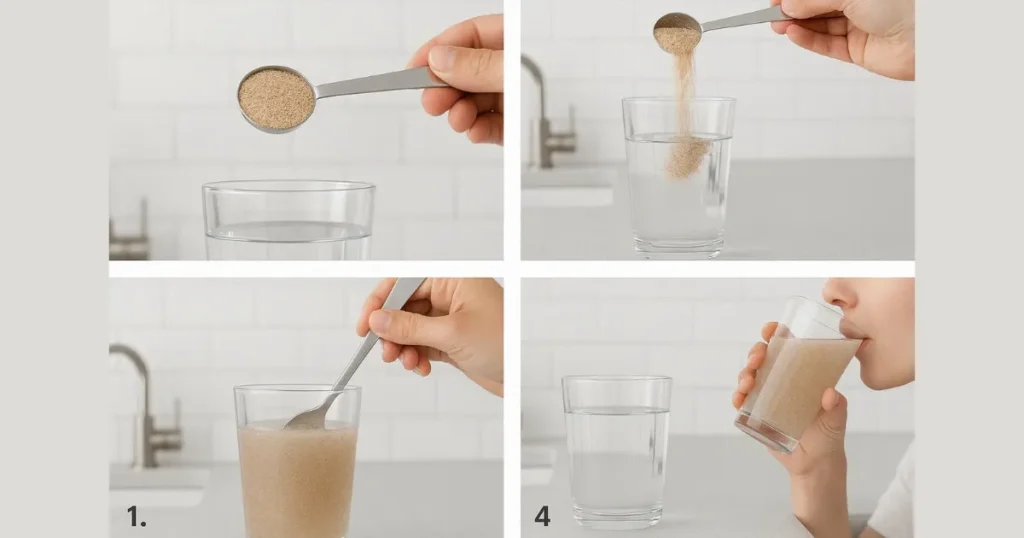
Basic preparation:
- Start with 1 teaspoon (5 grams).
- Mix vigorously in 250-300ml water.
- Drink immediately before thickening.
- Follow with another full glass of water.
- Take 30-60 minutes apart from medications.
Optimal timing:
Morning consumption on an empty stomach supports digestive regularity. Before meals helps appetite control and blood sugar management. Evening use may promote morning bowel movements.
Dosage progression:
- Week 1: 5 grams once daily.
- Week 2: 5 grams twice daily.
- Week 3+: 10-15 grams daily (split doses).
- Maximum: 30 grams with medical supervision.
Critical hydration:
You absolutely must drink 2-2.5 liters of water daily when using psyllium regularly. Insufficient hydration can cause intestinal blockage – the opposite of intended benefits.
Integration methods:
Mix into smoothies, yogurt, oatmeal, or juice. Add to baked goods as a fiber booster. Stir into soups as a natural thickener. The versatility makes consistent use easier.
Quality Matters: Why Pakistani Psyllium Excels.
When asking is psyllium husk good for you, quality determines effectiveness. Not all psyllium delivers equal results.
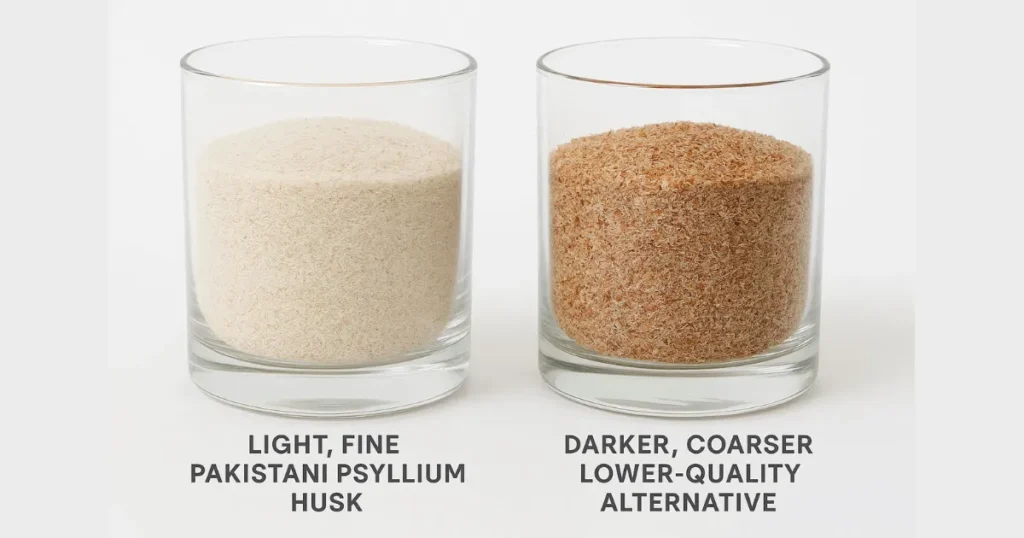
Pakistani advantages:
Pakistan, particularly regions where I grow and process psyllium, produces the world’s highest quality due to unique environmental factors:
- Purity levels: 95-99% versus 85-92% from other regions.
- Swelling capacity: Superior gel formation.
- Color: Lighter indicates fewer impurities.
- Mucilage content: Higher active component concentration.
- Processing standards: Pharmaceutical-grade protocols.
Quality indicators:
- Light cream to white color (dark suggests contamination).
- Fine, uniform texture.
- Minimal black seed particles.
- Strong gel formation in water test.
- Neutral smell and taste.
While India also produces psyllium, comparative laboratory testing consistently shows Pakistani varieties have 8-12% higher soluble fiber content and superior therapeutic properties.
At Malik Psyllium, we maintain complete farm-to-package traceability. Every batch undergoes rigorous testing for purity, microbial contamination, heavy metals, and swelling capacity – not just meeting standards but exceeding them.
Common Myths and Misconceptions.
Let me address frequent misunderstandings about what is psyllium husk good for.
Myth 1: “It’s just a laxative”.
Reality: While effective for constipation, calling psyllium merely a laxative understates its cardiovascular, metabolic, and gut health benefits. It’s a comprehensive wellness tool, not a single-purpose medication.
Myth 2: “All psyllium is identical”.
Reality: Source dramatically impacts effectiveness. Quality variations range from 85% to 99% purity, with swelling indices varying from 30-40%. These differences create real therapeutic outcome variations.
Myth 3: “You’ll become dependent”.
Reality: Unlike stimulant laxatives, psyllium doesn’t cause dependency. It works mechanically through bulk formation, not chemical stimulation. Your digestive system maintains normal function, allowing discontinuation anytime without withdrawal.
Myth 4: “It causes weight gain”.
Reality: Despite creating bulk, psyllium contains virtually zero digestible calories. The fiber passes through largely intact, taking waste with it while adding no caloric value.
Myth 5: “Effects are immediate”.
Reality: Natural solutions require patience. Expect initial digestive effects within 1-3 days, with optimal benefits developing over 2-4 weeks of consistent use.
Myth 6: “It interferes with all nutrients”.
Reality: While psyllium can affect medication absorption (requiring timing separation), it doesn’t significantly impact nutrient absorption from food. In fact, by promoting gut health, it may enhance nutrient uptake.
Side Effects and Safety Considerations.
Is psyllium husk good for you without risks? Generally, yes, but proper usage matters.
Common side effects:
- Temporary bloating: Affects 30-40% of new users, typically resolving within 2 weeks.
- Gas production: Mild to moderate, decreases as gut adapts.
- Abdominal cramping: Usually indicates excessive dosing.
- Allergic reactions: Rare (under 0.1%), more common in grass allergy sufferers.
Serious concerns requiring medical attention:
- Difficulty swallowing after consumption.
- Severe, persistent abdominal pain.
- Chest discomfort or breathing difficulty.
- Complete constipation lasting 7+ days.
- Allergic symptoms (rash, itching, swelling).
Who should exercise caution:
People with esophageal disorders, intestinal narrowing, or swallowing difficulties must consult healthcare providers first. Those with phenylketonuria should verify that products don’t contain aspartame additives.
Medication interactions:
Psyllium can reduce the absorption of lithium, carbamazepine, digoxin, and certain diabetes medications. Always maintain a 30-60 minute separation between fiber and pharmaceutical intake.
Special populations:
Pregnant women generally tolerate psyllium well for pregnancy-related constipation, but should consult obstetricians. Children over 6 can use it at half adult doses. Elderly individuals often benefit significantly but should start minimally.
Scientific Validation: Evidence-Based Benefits.
Understanding what is psyllium husk good for requires examining research evidence beyond anecdotal reports.
Cardiovascular research:
The American Journal of Clinical Nutrition meta-analysis of 21 trials conclusively demonstrated cholesterol-lowering effects. The European Food Safety Authority (EFSA) approved health claims for psyllium regarding cholesterol and bowel function – regulatory validation based on rigorous evidence review.
Diabetes management:
Multiple studies in Diabetes Care and related journals show consistent glycemic control improvements. The effect size rivals some pharmaceutical interventions without medication side effects.
Weight management:
Research in Appetite, Obesity, and Nutrition Reviews journals consistently shows satiety enhancement and modest weight loss support when combined with reasonable lifestyle modifications.
Gut microbiome:
Studies published in Alimentary Pharmacology & Therapeutics demonstrate prebiotic effects, increasing beneficial bacteria populations while reducing potentially harmful species. This microbiome optimization has far-reaching health implications.
Cancer prevention:
Large population studies suggest inverse relationships between fiber intake and colorectal cancer risk. While direct causation isn’t proven, the protective association appears consistent across diverse populations.
This isn’t folk medicine or marketing hype – it’s peer-reviewed science validating traditional use with modern methodology.
Comparison with Alternative Fiber Sources.
Is psyllium husk good for you compared to alternatives? Let’s examine objectively.
Psyllium vs. Wheat bran:
Psyllium: 70-85% soluble fiber, gentle action, gluten-free, cholesterol benefits.
Wheat bran: Primarily insoluble, more aggressive, contains gluten, fewer metabolic benefits.
Psyllium vs. Methylcellulose:
Psyllium: Natural, additional health benefits beyond bulking.
Methylcellulose: Synthetic, purely mechanical action, no metabolic effects.
Psyllium vs. Inulin:
Psyllium: Bulking fiber, broader applications, better tolerated.
Inulin: Prebiotic focus, causes significant gas in many people.
Psyllium vs. Flaxseed:
Psyllium: Pure fiber focus, neutral taste, better for constipation.
Flaxseed: 30% fiber plus omega-3s, nutty flavor, adds calories.
Psyllium vs. Chia seeds:
Psyllium: Maximum fiber concentration, minimal calories.
Chia: Additional protein and fats, more calories, different texture.
Real-World Applications and Success Stories.
Beyond research data, what is psyllium husk good for in actual lives? Let me share examples from three decades.
A corporate executive in Singapore managed to avoid statin medications entirely by combining psyllium with dietary modifications. His LDL dropped from 175 to 128 mg/dL over six months – eliminating medication necessity while avoiding side effects.
An endurance athlete in Germany resolved chronic race-day digestive issues using psyllium. The consistent gut function it provided allowed her to compete without gastrointestinal distress that had plagued previous events.
A type 2 diabetic grandmother in Canada maintained HbA1c below 6.5% for eight years using psyllium before meals, avoiding insulin therapy her doctor initially predicted would become necessary.
A nutritionist in Dubai incorporates psyllium into all client protocols for cholesterol management, reporting consistent 18-25 mg/dL LDL reductions when combined with Mediterranean-style eating patterns.
These aren’t marketing testimonials – they’re real outcomes from people who discovered how effectively psyllium works with proper usage and quality sourcing.
Special Considerations for Different Groups.
Is psyllium husk good for you in your specific situation? Different populations have unique considerations.
For diabetics:
Excellent blood sugar management tool, but monitor glucose levels closely during the initial weeks. Medication requirements often decrease as glycemic control improves. Always inform your endocrinologist when starting fiber supplementation to adjust treatment accordingly.
For elderly individuals:
Natural digestive function declines with age, making psyllium particularly valuable. Start with half doses (2.5 grams) and increase gradually. Ensure adequate hydration – elderly people often underestimate fluid needs.
For athletes:
Supports gut health during intense training when digestive issues commonly emerge. Take 2-3 hours before events to avoid discomfort during competition. Helps maintain regularity despite travel and dietary disruptions.
For children:
Generally safe from age 6+ at half adult doses (2.5-5 grams daily). Mix thoroughly to prevent choking hazards. Always supervise consumption and ensure adequate water intake. Consult pediatricians before starting any supplement.
For pregnant women:
Generally considered safe and often helpful for pregnancy-related constipation. However, always discuss with obstetricians before starting any supplement regimen during pregnancy or nursing.
Integration into Daily Life.
Understanding what is psyllium husk good for means nothing without practical integration. Here’s how people successfully incorporate it.
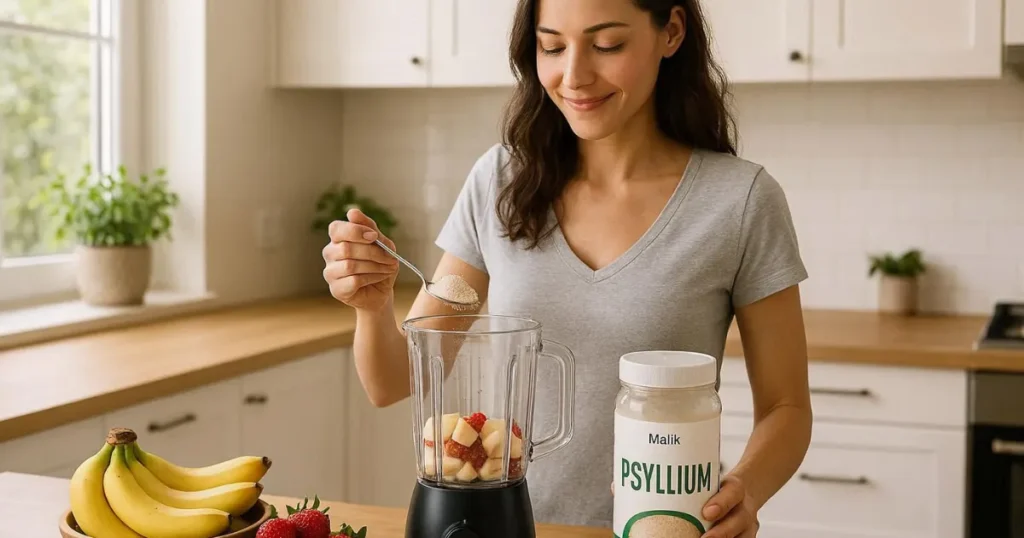
Morning ritual:
Mix into breakfast smoothies with fruits, protein powder, and yogurt. Blend thoroughly and consume within 5 minutes before excessive thickening. This provides 5 grams of fiber alongside your regular nutrition.
Pre-meal strategy:
Take 20-30 minutes before lunch or dinner to enhance satiety and control blood sugar response. This timing optimizes gel formation in your stomach before food arrives.
Baking applications:
Add 2-3 tablespoons to bread, muffin, or pancake recipes for fiber enrichment. Psyllium also functions excellently as a gluten-free binding agent in vegan baking, replacing eggs in many recipes.
Beverage enhancement:
Stir into fresh juices, cooled herbal teas, or flavored water. Avoid hot liquids, which cause premature gelling. Shaker bottles work excellently for thorough mixing.
Culinary thickener:
Add to soups, stews, or sauces during final cooking minutes as a natural thickener without altering flavor profiles. This method adds nutrition while creating desirable consistency.
Market Trends and Global Availability.
Is psyllium husk good for you from an accessibility perspective? Global demand has increased dramatically.
Market growth:
The international psyllium market expands 9-13% annually as consumers worldwide seek natural health solutions. North America and Europe represent 60% of consumption, with Asian markets growing rapidly.
Form variations:
- Whole husk: Traditional form, maximum fiber content.
- Powdered: Finely ground, easier mixing.
- Capsules: Convenient but require more units.
- Fortified foods: Added to cereals, bars, and beverages.
Pricing considerations:
Quality psyllium costs $15-25 per 500 grams. At therapeutic doses (10 grams daily), this provides 50 servings – approximately $0.30-0.50 per day for comprehensive health benefits addressing multiple conditions simultaneously.
Compare this to cholesterol medications costing $50-200 monthly or diabetes drugs at similar prices, all with potential side effects. The cost-benefit analysis strongly favors natural fiber supplementation when appropriate.
Making Informed Decisions.
When evaluating is psyllium husk good for you, smart purchasing ensures quality that delivers results.
Quality checklist:
- Pakistan origin verification.
- Purity 95% or higher.
- Recent harvest/production date.
- Light color without dark particles.
- Proper sealed packaging.
- Clear usage instructions.
- Company transparency.
- Reasonable pricing (extremely cheap suggests quality issues).
Red flags to avoid:
- Unknown origin.
- Dark coloration.
- Musty odors.
- Clumped texture.
- Absence of purity information.
- Suspiciously low pricing.
- Poor effectiveness reviews.
What is psyllium husk good for primarily?
Psyllium husk is excellent for digestive health, relieving both constipation and diarrhea through natural bulk formation. Additionally, it effectively manages cholesterol levels, controls blood sugar, supports weight management, and promotes cardiovascular health through multiple protective mechanisms.
Is psyllium husk good for you daily?
Yes, daily consumption is safe and recommended for sustained benefits. Start with 5 grams, gradually increasing to 10-15 grams. Maintain adequate hydration (2-2.5 liters of water daily) and take 30-60 minutes apart from medications for optimal safety and effectiveness.
How quickly does psyllium husk work?
Most people notice initial digestive effects within 12-72 hours. Optimal constipation relief appears after 1-2 weeks of consistent use. Cholesterol and blood sugar improvements typically require 4-6 weeks to manifest measurably. Patience with natural solutions yields sustainable results.
Can psyllium husk help with weight loss?
Psyllium supports weight management by creating satiety and reducing calorie intake naturally. Studies show 10-15% reduced calorie consumption when taken before meals. Combined with reasonable nutrition and activity, it contributes to sustainable weight loss, though it’s not a standalone solution.
Does psyllium husk lower cholesterol effectively?
Yes, 5-10 grams daily reduces LDL cholesterol by 5-15%, with FDA-approved health claims validating this benefit. The soluble fiber binds bile acids containing cholesterol, forcing your body to use blood cholesterol for new bile acid production, effectively lowering total cholesterol levels.
Is psyllium husk good for you if diabetic?
Absolutely. Psyllium slows glucose absorption, reducing post-meal blood sugar spikes by 10-20%. Studies show HbA1c improvements of nearly 1%, comparable to some medications. Monitor glucose closely initially, as medication requirements may decrease. Always consult your healthcare provider first.
What’s the difference between Pakistani and other psyllium?
Pakistani psyllium demonstrates 95-99% purity versus 85-92% from other regions, superior swelling capacity (12-14 vs. 8-10), and higher mucilage content due to optimal climate and soil. These differences translate to better therapeutic outcomes with smaller required doses.
Can you take psyllium husk long-term safely?
Yes, long-term use is safe without dependency concerns. Unlike stimulant laxatives, psyllium works mechanically through bulk formation, not chemical stimulation. Your digestive system maintains natural function. Discontinue anytime without withdrawal effects or rebound constipation issues.
Conclusion.
After dedicating three decades to psyllium cultivation, processing, and global supply, I can definitively answer what is psyllium husk good for; comprehensive wellness spanning digestive health, cardiovascular protection, metabolic support, weight management, and overall vitality. This isn’t marketing hyperbole – its evidence-based reality validated by rigorous science and countless real-world outcomes.
Is psyllium husk good for you specifically? For most people, absolutely yes. The safety profile is excellent, the benefits are substantial, and the cost is minimal compared to pharmaceutical alternatives. Whether you’re managing specific health conditions or simply optimizing wellness, psyllium offers natural, effective support that works with your body rather than against it.
The foundation of success lies in three principles, quality sourcing, proper preparation, and consistent use. Pakistani psyllium delivers superior results due to optimal growing conditions and rigorous quality standards. Proper hydration and gradual dosage increases ensure comfortable adaptation. Consistent daily use allows benefits to develop fully over weeks and months.
What is psyllium husk good for ultimately? It’s nature’s answer to multiple modern health challenges, elegantly packaged in a simple seed coating that has served humanity for centuries. No harsh chemicals, no complicated protocols – just pure, effective fiber working harmoniously with your body’s natural processes.
I encourage approaching psyllium with informed confidence. You now understand its mechanisms, comprehensive applications, proper usage, quality indicators, and safety considerations. This knowledge empowers you to make decisions aligned with your specific health goals and circumstances.
Your gut health influences everything from immunity to mood to chronic disease risk. By incorporating high-quality psyllium into your daily routine with adequate hydration and consistency, you’re investing in foundational wellness that supports optimal function across multiple body systems simultaneously.
Malik Shabbir
Featured Blogs
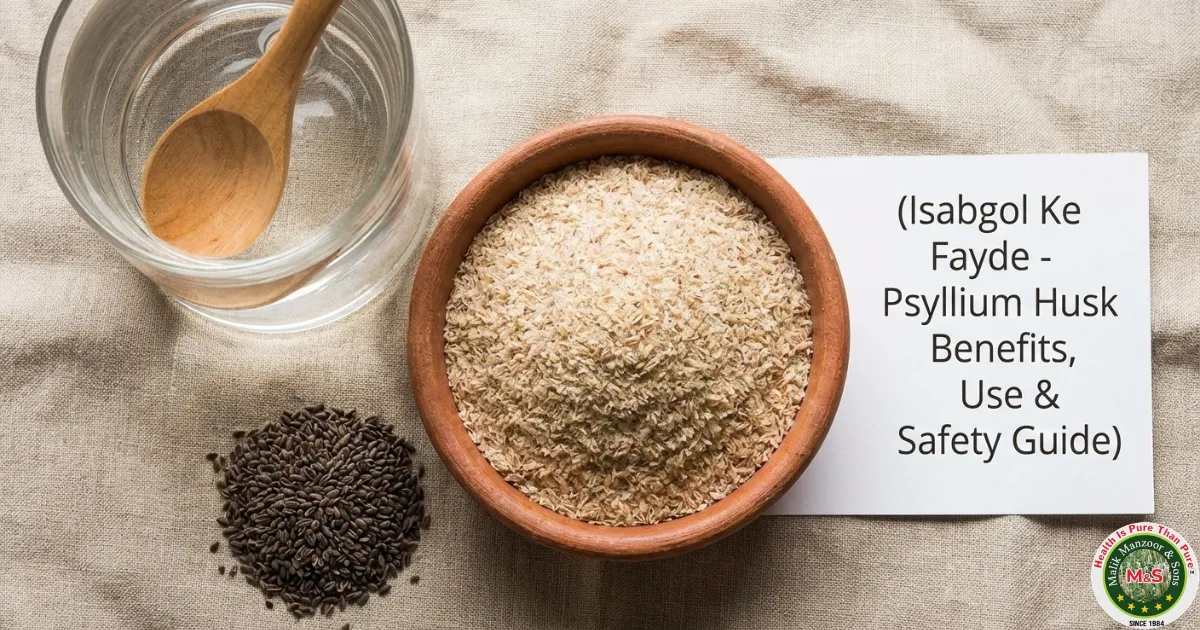
Isabgol Ke Fayde – Psyllium Husk Ke Poori Science-Based Rahnumayi – 2026
Isabgol ke fayde jaanna aaj ke daur mein zyada zaroori
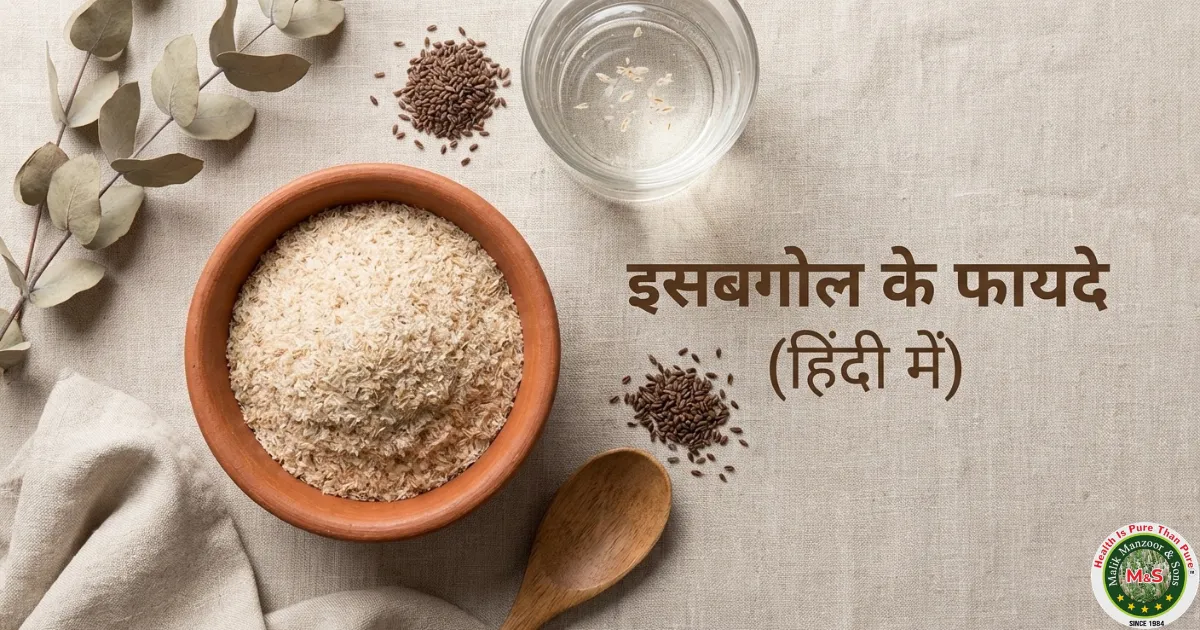
Isabgol Benefits in Hindi | Psyllium Husk Ke Fayde, Sahi Upyog Aur Savdhaniyan – 2026
Agar aap isabgol benefits in hindi mein samajhna chahte hain,
